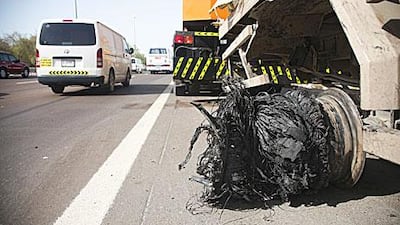ABU DHABI // Drivers have been warned to take care of their tyres this summer, as soaring temperatures make blowouts more likely.
Temperatures have reached more than 50°C this month, close to the country's record high of 52.1°C, and this extreme temperature makes tyres wear out faster.
Accordingly, motorists need to be more vigilant about maintaining them, said Hiren Srivastava, of tyre company Gulf Coasts Co.
"The hot climate is unavoidable but people can take some precautions to extend the life of their tyres, and to stay safe on the road," he said.
The company, which was established in 1987, imports and exports international brands. It has customers in more than 20 countries, and an annual turnover of upwards of US$71 million (Dh261m).
Mr Srivastava said most international tyre brands claimed non-commercial tyres could run up to 120,000km before going bald.
However, he added this was only the case when people took appropriate care of them: fitting the correct size and type, constantly maintaining inflation pressure and the car's alignment, suspension and brakes and only using a vehicle for the purpose it was designed for, within specified load conditions.
"In the UAE, the lifespan for non-commercial tyres is 75,000km to 80,000km and, for commercial tyres, is 40,000km to 50,000km, if used under these conditions," said Mr Srivastava.
Tyres often wore out faster than this in the UAE, he said, because of sudden braking and accelerating, lack of maintenance and – most of all – the high temperatures.
"Heat is the biggest enemy of rubber. The hotter a tyre runs, the greater its tread wears. Although ambient temperature does not affect inflation pressure much in tyres filled with nitrogen, it does affect the temperature of the tyre," Mr Srivastava said.
"With an ambient temperature of 45°C in the Middle East during summer, the temperature of a tyre reaches up to 70°C."
And the tread temperature increases on long drives due to road contact.
He said: "This multiplies on high speeds over 100kph. At certain times, tread temperatures reach up to 110°C within a one-hour drive. Tests have shown that tyres become explosive at 130°C."
Vehicle misalignment could also drastically reduce tyre lifespans. "A tyre tread is usually 7mm to 8mm, which gives a mileage of about 80,000km.
A small misalignment can take off millimetres of tread, and 10,000km of mileage are lost for every millimetre lost," he said.
Adhil Chola, a supervisor at Al Fatah Tyres, said it was a crucial time for people to check up on the wear and tear of their wheels.
He said: "Compared with other countries, it gets really hot. The temperature here can easily get up to 47°C.
"Even if people think it's safe, they need to be sure. A lot of accidents happen because people don't check their tyres.
"You're supposed to check your tyres, your wheel balance and alignment every 10,000km but a lot of people don't do this."
Al Fatah Tyres changes 2,000 tyres a week, and more than 100,000 a year.
Mr Chola said about 90 per cent of his customers had already changed their tyres before this summer began, whereas most changed them during the summer last year.
He said it was possible to prolong tyre life by rotating front and back tyres, because cars usually use back tyres more than the front ones.
"Usually, cracks start appearing after three years of use, so people should change them about every three years.
"But sports cars like Mercedes and BMWs have wider back wheels than front wheels. These wheels only last two years, at most, because you can't rotate them."
halbustani@thenational.ae
Polarised public
31% in UK say BBC is biased to left-wing views
19% in UK say BBC is biased to right-wing views
19% in UK say BBC is not biased at all
Source: YouGov
THE SPECS
Engine: 3.5-litre supercharged V6
Power: 416hp at 7,000rpm
Torque: 410Nm at 3,500rpm
Transmission: 6-speed manual
Fuel consumption: 10.2 l/100km
Price: Dh375,000
On sale: now
Company profile
Name: Thndr
Started: October 2020
Founders: Ahmad Hammouda and Seif Amr
Based: Cairo, Egypt
Sector: FinTech
Initial investment: pre-seed of $800,000
Funding stage: series A; $20 million
Investors: Tiger Global, Beco Capital, Prosus Ventures, Y Combinator, Global Ventures, Abdul Latif Jameel, Endure Capital, 4DX Ventures, Plus VC, Rabacap and MSA Capital
ABU%20DHABI'S%20KEY%20TOURISM%20GOALS%3A%20BY%20THE%20NUMBERS
%3Cp%3EBy%202030%2C%20Abu%20Dhabi%20aims%20to%20achieve%3A%3C%2Fp%3E%0A%3Cp%3E%3Cstrong%3E%E2%80%A2%2039.3%20million%20visitors%2C%3C%2Fstrong%3E%20nearly%2064%25%20up%20from%202023%3C%2Fp%3E%0A%3Cp%3E%3Cstrong%3E%E2%80%A2%20Dh90%20billion%20contribution%20to%20GDP%2C%3C%2Fstrong%3E%20about%2084%25%20more%20than%20Dh49%20billion%20in%202023%3C%2Fp%3E%0A%3Cp%3E%3Cstrong%3E%E2%80%A2%20178%2C000%20new%20jobs%2C%3C%2Fstrong%3E%20bringing%20the%20total%20to%20about%20366%2C000%3C%2Fp%3E%0A%3Cp%3E%3Cstrong%3E%E2%80%A2%2052%2C000%20hotel%20rooms%2C%3C%2Fstrong%3E%20up%2053%25%20from%2034%2C000%20in%202023%3C%2Fp%3E%0A%3Cp%3E%3Cstrong%3E%E2%80%A2%207.2%20million%20international%20visitors%2C%3C%2Fstrong%3E%20almost%2090%25%20higher%20compared%20to%202023's%203.8%20million%3C%2Fp%3E%0A%3Cp%3E%3Cstrong%3E%E2%80%A2%203.9%20international%20overnight%20hotel%20stays%2C%3C%2Fstrong%3E%2022%25%20more%20from%203.2%20nights%20in%202023%3C%2Fp%3E%0A
Courses%20at%20Istituto%20Marangoni%2C%20Dubai
%3Cp%3E%3Cstrong%3EUndergraduate%20courses%3C%2Fstrong%3E%3Cbr%3EInterior%20Design%3B%20Product%20Design%3B%20Visual%20Design%3B%20Fashion%20Design%20%26amp%3B%20Accessories%3B%20Fashion%20Styling%20%26amp%3B%20Creative%20Direction%3B%20Fashion%20Business%3B%20Foundation%20in%20Fashion%3B%20Foundation%20in%20Design%3Cbr%3E%3Cstrong%3EProfessional%20courses%3C%2Fstrong%3E%3Cbr%3EFashion%20e-Commerce%20%26amp%3B%20Digital%20Marketing%3B%20Fashion%20Entrepreneurship%3B%20Fashion%20Luxury%20Retail%20and%20Visual%20Merchandising%3Cbr%3E%3Cstrong%3EShort%20courses%3C%2Fstrong%3E%3Cbr%3EFashion%20design%3B%20Fashion%20Image%20%26amp%3B%20Styling%3B%20Fashion%20Trend%20Forecasting%3B%20Interior%20Design%3B%20Digital%20Art%20in%20Fashion%3Cbr%3EMore%20information%20is%20at%20%3Ca%20href%3D%22https%3A%2F%2Fwww.istitutomarangoni.com%2Fen%3Futm_source%3DLocal%26utm_medium%3Dorganic%26utm_campaign%3Dgmb%26utm_content%3Ddubai%22%20target%3D%22_self%22%3Ewww.istitutomarangoni.com%3C%2Fa%3E%3C%2Fp%3E%0A
Small Victories: The True Story of Faith No More by Adrian Harte
Jawbone Press
Frankenstein in Baghdad
Ahmed Saadawi
Penguin Press
COMPANY PROFILE
Name: Kumulus Water
Started: 2021
Founders: Iheb Triki and Mohamed Ali Abid
Based: Tunisia
Sector: Water technology
Number of staff: 22
Investment raised: $4 million
Key Points
- Protests against President Omar Al Bashir enter their sixth day
- Reports of President Bashir's resignation and arrests of senior government officials
Skoda Superb Specs
Engine: 2-litre TSI petrol
Power: 190hp
Torque: 320Nm
Price: From Dh147,000
Available: Now
The specs
Engine: 2.0-litre 4-cyl turbo
Power: 201hp at 5,200rpm
Torque: 320Nm at 1,750-4,000rpm
Transmission: 6-speed auto
Fuel consumption: 8.7L/100km
Price: Dh133,900
On sale: now
UAE currency: the story behind the money in your pockets
How has net migration to UK changed?
The figure was broadly flat immediately before the Covid-19 pandemic, standing at 216,000 in the year to June 2018 and 224,000 in the year to June 2019.
It then dropped to an estimated 111,000 in the year to June 2020 when restrictions introduced during the pandemic limited travel and movement.
The total rose to 254,000 in the year to June 2021, followed by steep jumps to 634,000 in the year to June 2022 and 906,000 in the year to June 2023.
The latest available figure of 728,000 for the 12 months to June 2024 suggests levels are starting to decrease.

